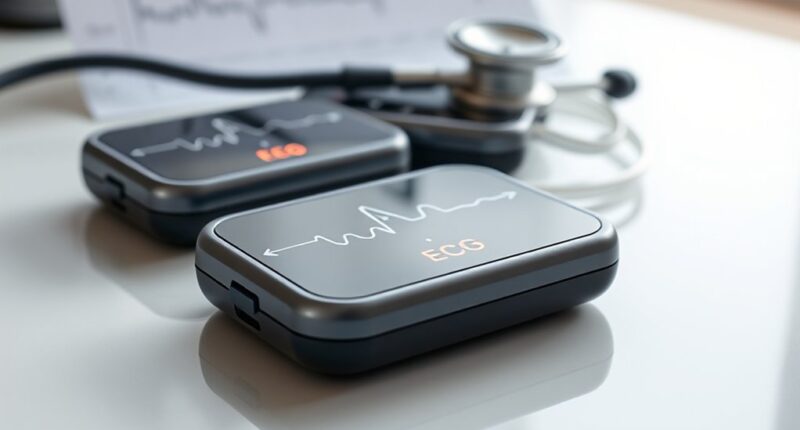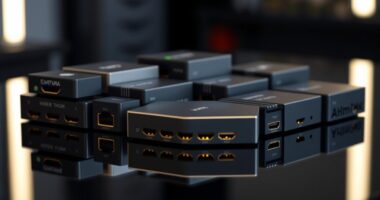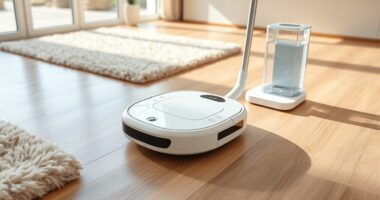If you’re looking for the best wireless ECG monitors, I’ve found options that are accurate, easy to use, and compatible with smartphones. Devices like the KardiaMobile 6-Lead and EMAY models offer quick, reliable heart readings without wedges or wires, suitable for daily health checks or fitness tracking. Many support Bluetooth and Wi-Fi, making data sharing seamless. Keep exploring to discover which monitor fits your needs and how they make heart monitoring simple.
Key Takeaways
- Many models provide quick, medical-grade ECG readings within 30 seconds, suitable for daily monitoring.
- Compatibility with smartphones via Bluetooth, Wi-Fi, or USB ensures seamless data sharing and real-time analysis.
- Compact, lightweight designs with water-resistant features make them convenient for on-the-go health tracking.
- Advanced algorithms reduce noise, providing accurate detection of arrhythmias like AFib and heart rate trends.
- Most devices are user-friendly, requiring no subscription fees, with data storage and sharing options for easy health management.
AliveCor KardiaMobile 6-Lead Personal EKG Monitor

If you’re looking for a reliable personal ECG monitor that provides detailed, medical-grade data, the AliveCor KardiaMobile 6-Lead stands out as an excellent choice. It delivers accurate six-lead EKG recordings in just 30 seconds, giving you quick insights into your heart rhythm. With six times more data than standard single-lead devices, it enhances your heart analysis and sharing capabilities. Compatible with most smartphones and tablets via the Kardia app, it requires no subscription for core features. Trusted by healthcare professionals, this portable device detects arrhythmias like AFib, bradycardia, and tachycardia, making it a valuable tool for proactive heart health management.
Best For: individuals seeking a reliable, portable, and medical-grade personal ECG monitor for proactive heart health management at home.
Pros:
- Provides accurate six-lead EKG recordings in just 30 seconds for detailed heart analysis
- Compatible with most smartphones and tablets, with no subscription required for core features
- Detects common arrhythmias like AFib, bradycardia, and tachycardia, trusted by healthcare professionals
Cons:
- Not tested or recommended for use with pacemakers or implantable cardioverter defibrillators (ICDs)
- Does not assess or detect heart attacks
- Requires downloading the Kardia app and ensuring device compatibility
EverOne EVOPM10 Portable Bluetooth ECG Monitor with App
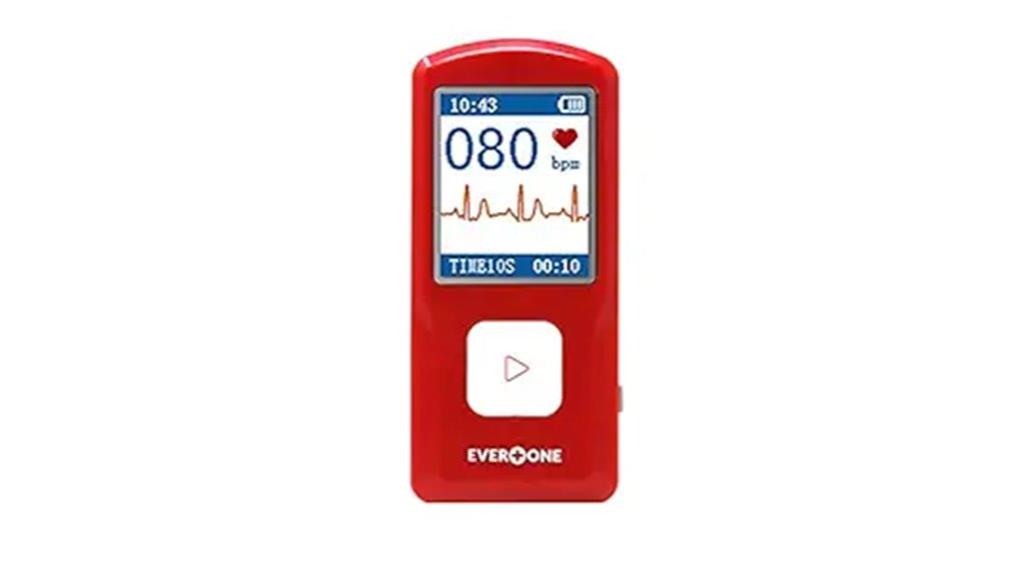
The EverOne EVOPM10 Portable Bluetooth ECG Monitor stands out for those seeking a highly portable and user-friendly device to track heart health on the go. Its compact size (just 3.9 x 1.8 x 0.6 inches) and lightweight design make it easy to carry anywhere. No wires or electrodes are needed—simply press a button, place the sensor on your chest, wrist, or ankle, and get results in 10-30 seconds. The device connects seamlessly via Bluetooth to a free iOS or Android app, allowing you to view, store, and share data effortlessly. Its rechargeable battery provides up to 500 measurements per charge, ensuring reliable, continuous monitoring.
Best For: individuals seeking a portable, easy-to-use ECG monitor for convenient heart health tracking on the go.
Pros:
- Compact, lightweight design for maximum portability
- No wires or electrodes needed, simplifying the measurement process
- Wireless Bluetooth connectivity with free apps for seamless data management
Cons:
- Limited to 500 measurements per full charge, which may require recharging for frequent use
- Results may take up to 30 seconds, slightly longer than some users prefer
- Compatibility limited to certain operating systems and third-party apps, which could restrict integration
Beurer Cardio Companion EKG Monitor
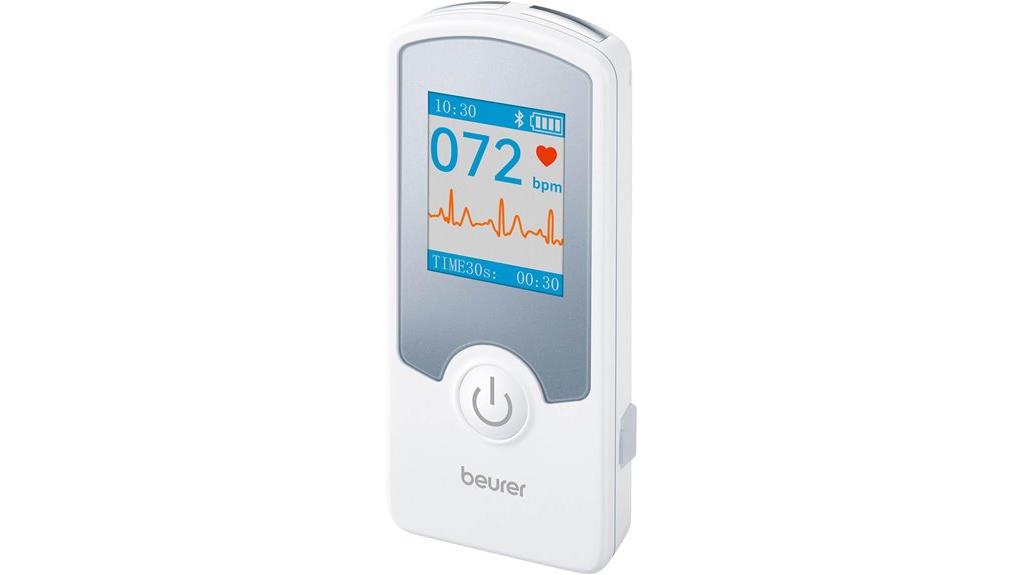
The Beurer Cardio Companion EKG Monitor (ME75) is an excellent choice for individuals seeking quick, reliable heart rhythm readings at home. This German-engineered, FDA-cleared device delivers accurate results in under 30 seconds and displays them on a bright color screen. It offers four measurement options—hand-to-hand, hand-to-wrist, leg, or chest—to suit different preferences. For ideal accuracy, avoid skin-to-skin contact during testing. The device tracks irregular rhythms and arrhythmias in real time, providing peace of mind. With Bluetooth connectivity and local storage, you can easily save and review your heart data, making it a convenient solution for ongoing heart health monitoring.
Best For: individuals seeking a quick, reliable, and portable ECG device for at-home heart rhythm monitoring with real-time results and optional Bluetooth data management.
Pros:
- Fast and accurate heart rhythm readings in under 30 seconds
- Multiple measurement options (hand-to-hand, hand-to-wrist, leg, chest) for versatile use
- Bluetooth connectivity for unlimited data storage and easy review via the free app
Cons:
- Not compatible with pacemakers, metal implants, or electrical implants due to potential interference
- Requires avoidance of skin-to-skin contact during measurement for optimal accuracy
- May be limited in advanced medical diagnostics compared to clinical ECG machines
EMAY 6L Portable ECG Monitor
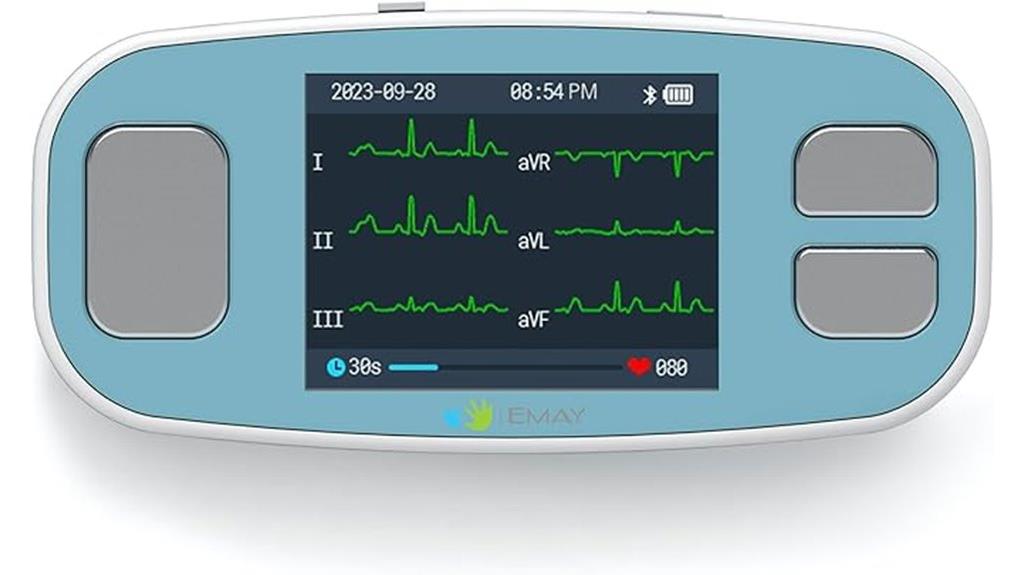
For those seeking a portable and easy-to-use ECG monitor for home health care, the EMAY 6L stands out with its 6-channel ECG recording capabilities. It connects seamlessly via Bluetooth to smartphones and USB to PCs, with no subscription fees. The device features a 2.4-inch display, a rechargeable lithium battery, and supports sample mode, case upload, and review functions. Compact and lightweight at just 85 grams, it’s suitable for unisex adult use at home. While not for implanted pacemakers or hospital diagnostics, its user-friendly design and reliable performance make it an excellent choice for convenient heart monitoring.
Best For: individuals seeking a portable, easy-to-use ECG monitor for reliable home heart health tracking without the need for professional equipment.
Pros:
- Wireless connectivity via Bluetooth and USB for versatile device pairing
- No subscription or hidden costs required for use and data management
- Compact and lightweight design (85 grams) for convenient portability
Cons:
- Not suitable for use with implanted pacemakers or as a hospital diagnostic device
- Limited to unisex adult use; not designed for children or seniors
- Does not replace professional medical diagnosis; intended for personal monitoring only
EMAY Portable ECG Monitor with Heart Rate Recording
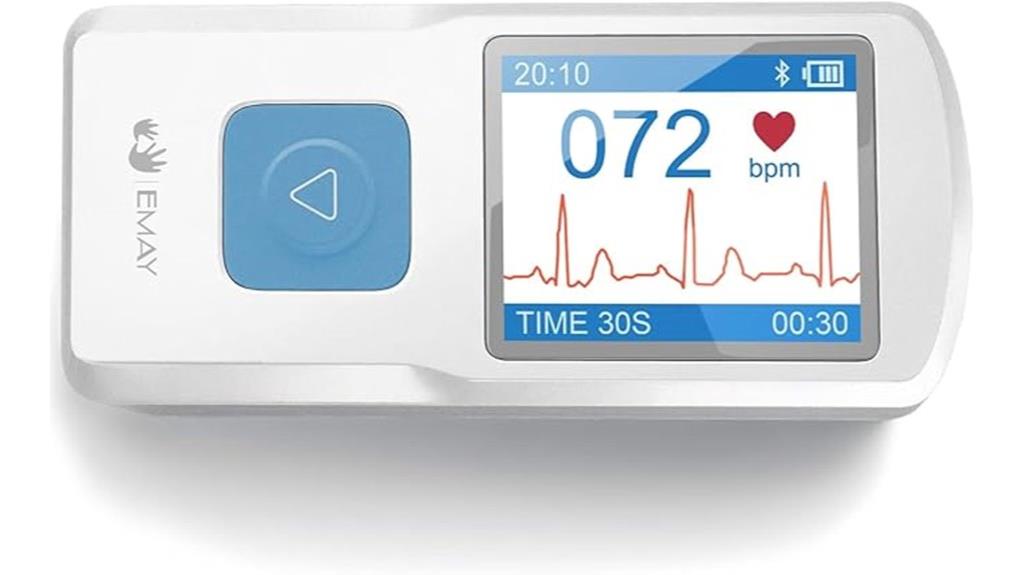
If you’re seeking an easy-to-use device for reliable heart rate and ECG monitoring at home, the EMAY Portable ECG Monitor stands out. It records and stores Lead I ECG signals, displays your heart rate, and connects seamlessly to smartphones via Bluetooth or PCs via USB. Compact and lightweight, it’s powered by a rechargeable lithium battery, making it perfect for OTC use. While it’s not suitable for implanted pacemakers or replacing professional diagnostics, it offers convenient features like sample mode, time setting, and data review. Rated 4.6 stars from 227 reviews, it’s a practical choice for personal health monitoring outside clinical settings.
Best For: individuals seeking an easy-to-use, portable device for reliable heart rate and ECG monitoring at home outside clinical settings.
Pros:
- Compact, lightweight design for convenience and portability
- Wireless connectivity via Bluetooth and USB for seamless data transfer
- User-friendly features like sample mode, time setting, and data review
Cons:
- Not suitable for users with implanted pacemakers
- Does not replace professional hospital diagnostic ECG devices
- Limited to Lead I ECG signals, which may not provide comprehensive cardiac information
KardiaMobile 1-Lead Personal EKG Monitor
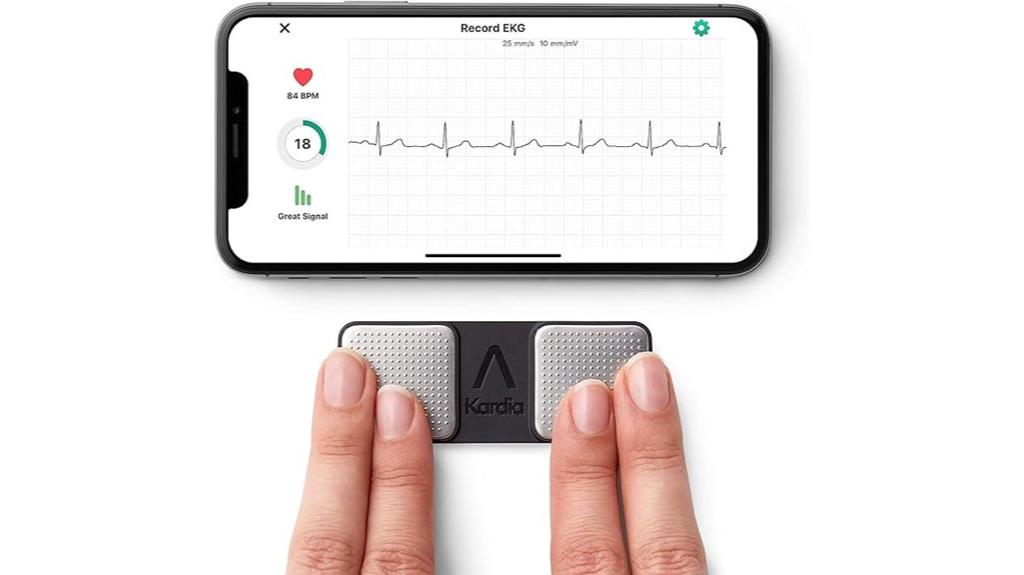
Looking for a reliable, easy-to-use personal EKG monitor that fits in your pocket? The KardiaMobile 1-Lead is just that. It records medical-grade EKGs in 30 seconds and detects AFib, arrhythmias, Bradycardia, Tachycardia, and normal sinus rhythm. Its small, lightweight design makes it portable and compatible with most smartphones and tablets via the Kardia app—no subscription needed for core features. Simply place your fingers on the sensors for instant analysis, and you can email or save your history. Trusted by professionals and FDA-cleared, it’s a convenient, dependable device for monitoring your heart health anytime, anywhere.
Best For: individuals seeking a portable, easy-to-use personal EKG device to monitor heart rhythm and detect arrhythmias at home or on the go.
Pros:
- Compact and lightweight, easily fits in a pocket or bag.
- Quick 30-second recordings with instant analysis, compatible with most smartphones and tablets.
- No subscription required for core detection features; trusted and FDA-cleared for accuracy.
Cons:
- Not tested with pacemakers or ICDs, and does not check for heart attacks.
- Requires compatible device with a screen of at least 0.96 inches; may not work with very older or basic phones.
- Limited to 1-lead EKGs, which may not provide as comprehensive data as multi-lead monitors.
Portable ECG Monitor for Heart Rate and ECG Recording
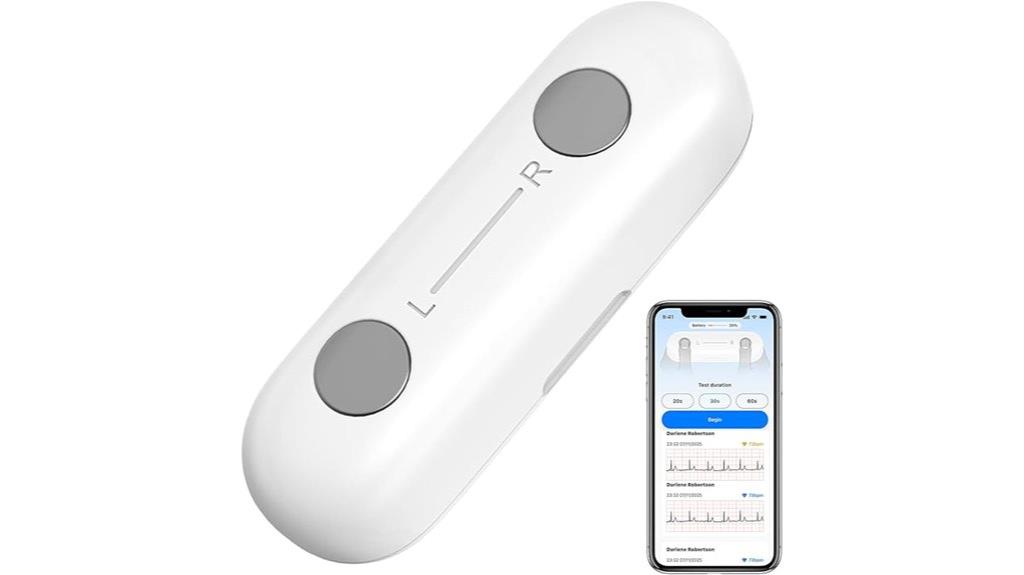
The Portable ECG Monitor for Heart Rate and ECG Recording stands out as an ideal choice for adults over 20 who want a convenient way to track their heart health at home. It records and stores Lead I ECG signals, providing essential data like heart rate, P-wave, PR-interval, QRS complex, and QTc within just 30 seconds. Compatible with both iOS and Android devices via Bluetooth, it allows unlimited data storage without subscriptions. Easy to use, I just follow simple steps—keeping my skin dry and hands properly positioned—to get accurate readings. This compact device helps me proactively monitor my heart and share data effortlessly with my healthcare provider.
Best For: adults over 20 seeking an easy, at-home solution to monitor their heart health and ECG data without professional equipment.
Pros:
- Provides quick, comprehensive ECG data within 30 seconds for proactive health monitoring
- Compatible with both iOS and Android devices via Bluetooth, with unlimited storage and no subscription fees
- Easy to use with simple steps, making it suitable for non-professional users at home
Cons:
- Not suitable for users with implanted pacemakers or requiring hospital-grade diagnostics
- May require proper technique and skin preparation to ensure measurement accuracy
- Does not replace professional medical equipment or diagnosis
Portable Heart Rate Monitor with Smartphone App Compatibility
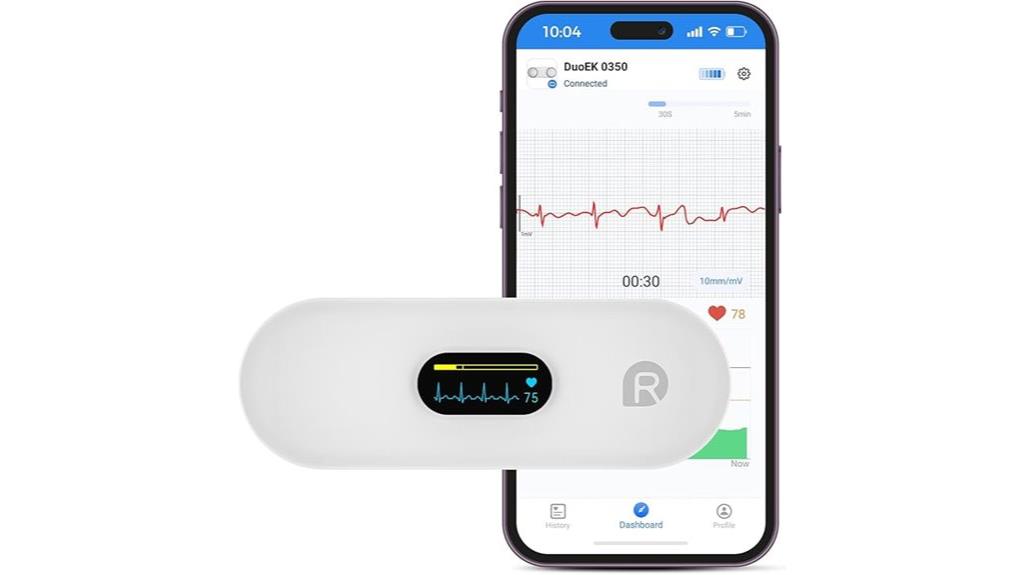
A portable heart rate monitor with smartphone app compatibility is ideal for anyone seeking quick, accurate insights into their heart health on the go. It provides high-precision readings in just 30 seconds through hand, ankle, or chest recordings. The easy setup involves simply placing your fingers on sensors, with real-time rhythm displayed on an OLED screen. Its compact, durable design fits easily in your pocket, and one charge supports up to 500 measurements. Seamlessly connect to your iOS or Android device to track, record, and share data with your doctor, making ongoing heart monitoring simple and convenient anywhere you are.
Best For: individuals who need quick, accurate heart rate monitoring on the go and want to easily share their data with healthcare providers.
Pros:
- Provides high-accuracy heart rate readings in just 30 seconds using multiple recording methods.
- Compact, portable, and durable design suitable for everyday use anywhere.
- Seamless app integration allows easy tracking, sharing, and long-term health monitoring.
Cons:
- Requires a smartphone with compatible iOS or Android to utilize app features fully.
- Limited to 500 measurements per charge, which may be insufficient for very frequent monitoring.
- Does not specify advanced features such as ECG or detailed rhythm analysis beyond basic detection.
Pursonic EKG Monitor & Wellness Tracker Portable Handheld LCD Display
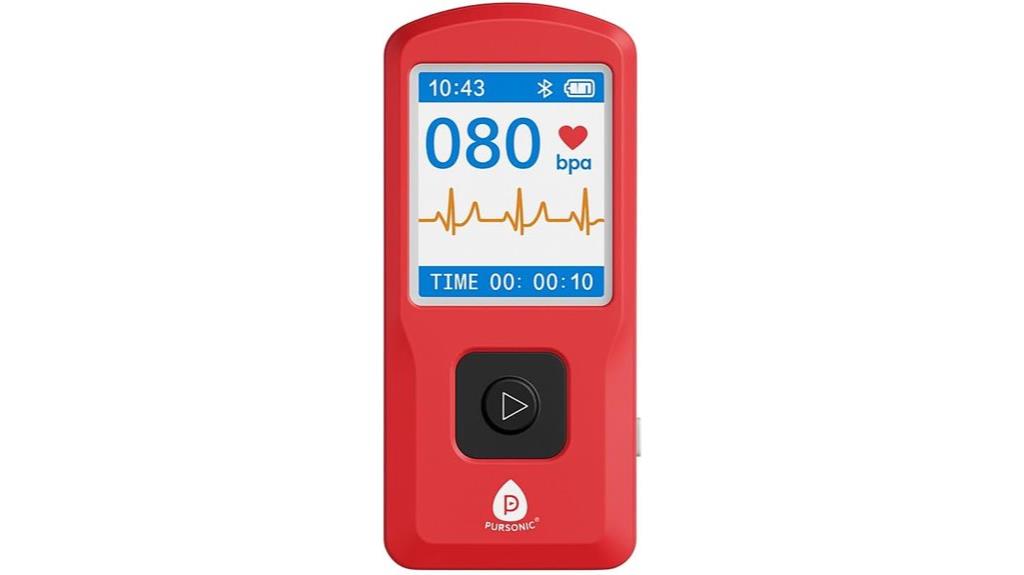
If you want a portable ECG monitor that’s simple to use and perfect for everyday health tracking, the Pursonic EKG Monitor & Wellness Tracker is an excellent choice. This handheld device features a built-in color LCD screen that displays real-time wellness metrics and trend analysis, making it easy to monitor your heart health on the go. Its one-button operation ensures straightforward use, while the compact, lightweight design fits comfortably in your hand. Powered by a rechargeable lithium battery and compatible with a companion app and PC software, it offers convenient data review, export, and sharing—ideal for those seeking an accessible, personal health monitoring tool.
Best For: individuals seeking a portable, easy-to-use personal ECG and wellness tracker for daily health monitoring without the need for a smartphone.
Pros:
- User-friendly one-button operation simplifies daily use
- Compact, lightweight design for portability and convenience
- Compatible with app and PC software for detailed data review and sharing
Cons:
- Not suitable for users with pacemakers or those requiring medical-grade ECG accuracy
- Limited to over-the-counter personal monitoring, not a replacement for clinical equipment
- Requires regular charging due to rechargeable battery use
Magene H64 Heart Rate Monitor Chest Strap
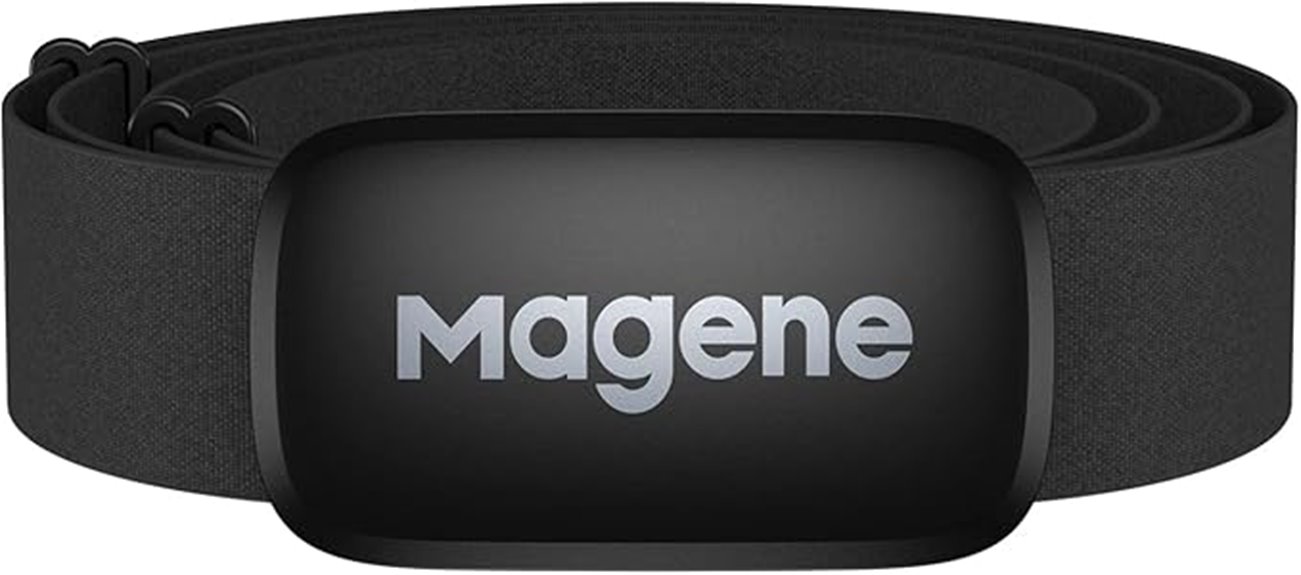
For athletes and fitness enthusiasts seeking reliable heart rate data during intense workouts, the Magene H64 Heart Rate Monitor Chest Strap stands out with its compatibility and durability. It uses optimized hardware and algorithms to deliver accurate, real-time heart rate readings. Compatible with ANT+ and Bluetooth, it can transmit data to multiple devices simultaneously, including fitness apps, bike computers, and sport watches. Its IP67 rating makes it dustproof and waterproof, suitable for various environments. With a battery life of up to 1,000 hours and automatic sleep mode, it’s built for long-term use. Made of durable plastic, it’s lightweight and designed for comfort during rigorous activity.
Best For: athletes and fitness enthusiasts seeking a reliable, durable heart rate monitor compatible with multiple devices for intense workouts.
Pros:
- Compatible with ANT+ and Bluetooth, enabling connection to multiple devices simultaneously.
- IP67 dustproof and waterproof rating, suitable for various environmental conditions.
- Long battery life of up to 1,000 hours with automatic sleep mode to conserve power.
Cons:
- Requires proper initial setup, including removing the insulating sheet and ensuring skin contact for accurate readings.
- Made of plastic, which may feel less premium compared to higher-end materials.
- Customer ratings are moderate, with some users reporting connectivity or comfort issues.
KYTO Heart Rate Monitor Chest Strap, ANT+/Bluetooth, Compatible with iOS/Android Apps
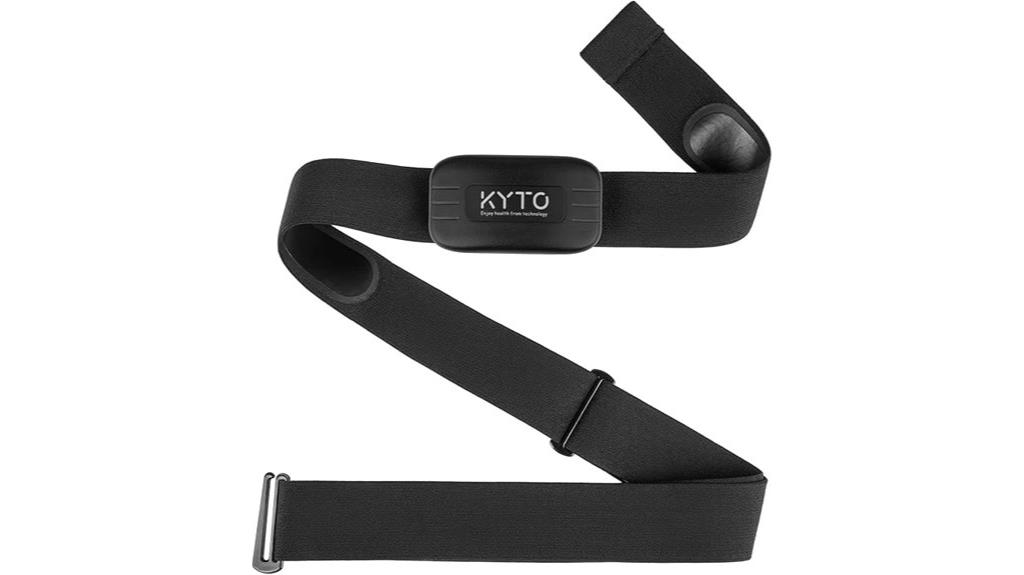
The KYTO Heart Rate Monitor Chest Strap stands out as an ideal choice for fitness enthusiasts who want accurate, real-time heart rate tracking across multiple sports and devices. It supports Bluetooth 4.0 and ANT+, making it compatible with a wide range of third-party apps like Strava, Zwift, and Polar Beat, as well as iOS and Android devices. The soft, adjustable strap guarantees comfort during demanding workouts, while its durable design and IP67 water resistance make it suitable for most activities. With a replaceable battery offering up to 200 hours of use, it delivers precise data on heart rate and calories, helping me optimize my training effectively.
Best For: Fitness enthusiasts and athletes seeking accurate, real-time heart rate monitoring across multiple sports and device platforms.
Pros:
- Compatible with a wide range of third-party fitness apps and iOS/Android devices for versatile use
- Durable, water-resistant design suitable for most sports and activities
- Long-lasting replaceable battery providing up to 200 hours of continuous use
Cons:
- Not suitable for swimming due to IP67 water resistance limitations
- Requires regular replacement of the battery for extended use
- May be less comfortable for users with smaller chest sizes outside the 65-95cm strap adjustment range
Magene H603 Chest Heart Rate Monitor with Adjustable Strap
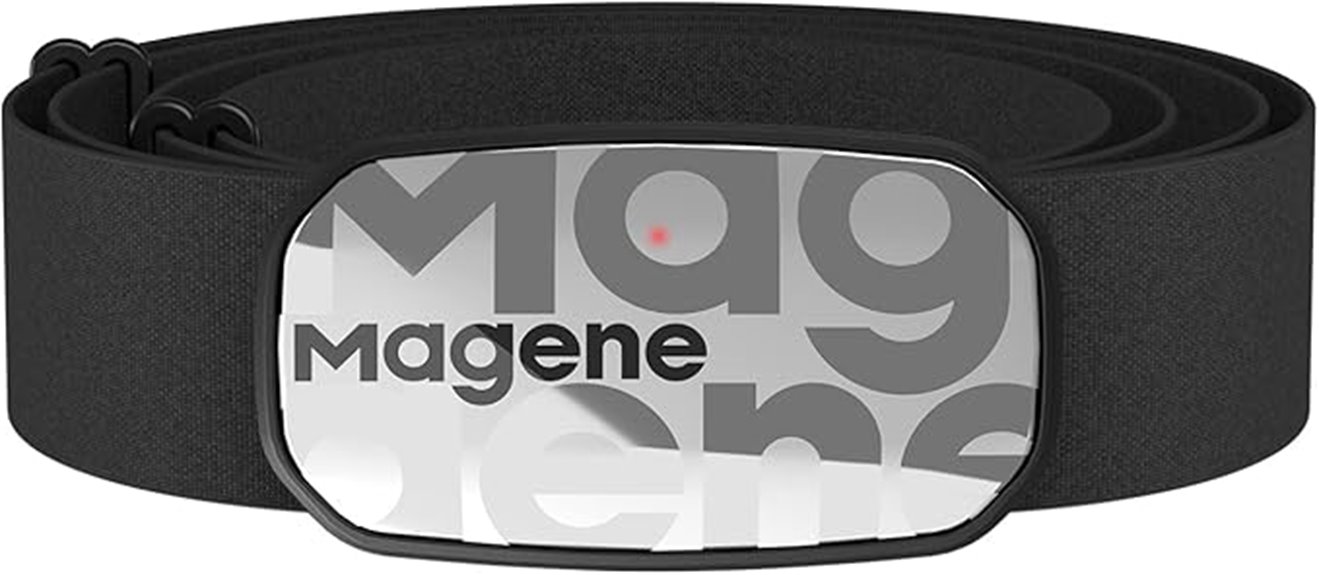
Magene H603 Chest Heart Rate Monitor with Adjustable Strap stands out for its impressive accuracy and durability, making it an ideal choice for serious athletes and fitness enthusiasts. It uses a self-research algorithm that directly extracts real-time heart rate data, reducing noise from movement and sweating. The split chest strap design offers comfort and improved fit. Its shell is made with IML injection molding, making it wear-resistant and scratch-proof, even in sweaty conditions. Supporting both ANT+ and Bluetooth simultaneously, it connects seamlessly to various devices and apps. With up to 1000 hours of battery life and IP67 water resistance, this monitor is built to perform reliably during intense workouts.
Best For: serious athletes and fitness enthusiasts seeking highly accurate, durable heart rate monitoring during intense workouts.
Pros:
- Employs a self-research algorithm for precise real-time heart rate measurement, reducing noise from movement and sweating
- Durable IML injection-molded shell that is scratch-proof and sweat-resistant, suitable for rigorous use
- Supports both ANT+ and Bluetooth simultaneously for seamless connectivity with a wide range of devices and apps
Cons:
- Requires initial setup and pairing, which may be complex for some users unfamiliar with Bluetooth or ANT+ devices
- Battery life, while long-lasting, may be overkill for casual users who don’t need extended use
- The chest strap design may not be as comfortable for all users compared to wrist-based heart rate monitors
Magene H303 Heart Rate Monitor Chest Strap
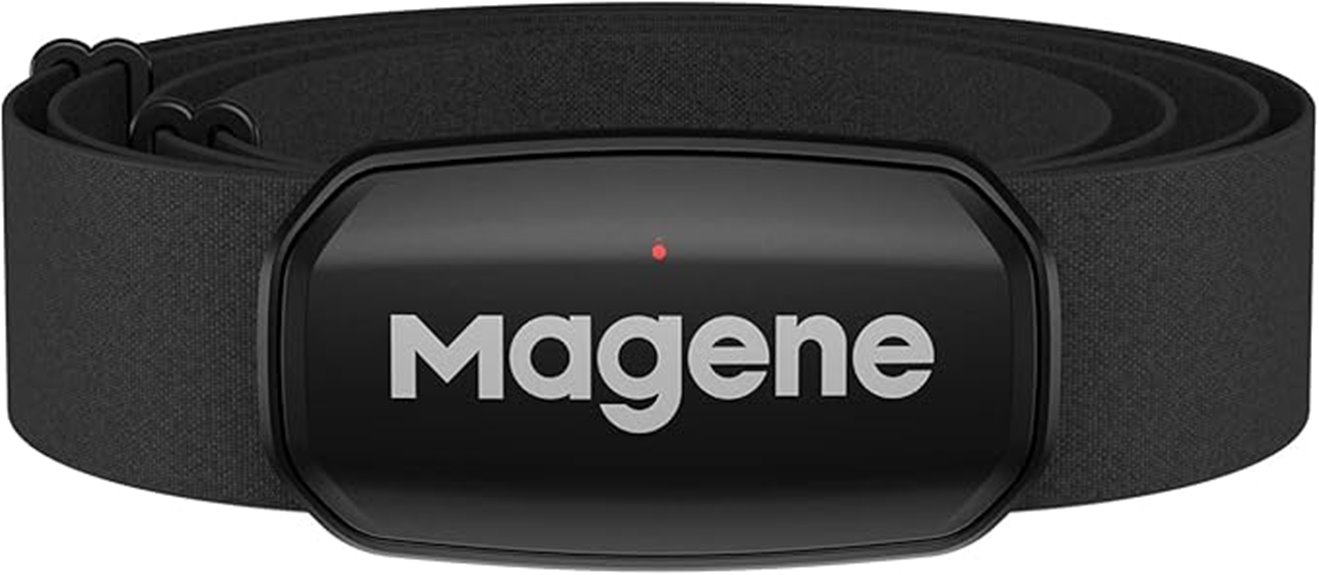
If you’re seeking a reliable chest strap that delivers accurate heart rate data during intense workouts, the Magene H303 stands out. Its new hardware design and advanced algorithms minimize noise from movement and sweating, ensuring precise readings. The LED indicator confirms heart rate detection and connection at a glance, making it easy to stay focused. Made from durable, wear-resistant materials and rated IP67 for water resistance, it’s built to last through tough conditions—though not suitable for swimming. Supporting dual ANT+ and Bluetooth connections, it seamlessly integrates with multiple devices and apps, making it versatile for various sports like cycling, running, and more.
Best For: athletes and fitness enthusiasts seeking a durable, accurate heart rate monitor that seamlessly integrates with multiple devices and apps for various sports activities.
Pros:
- Accurate heart rate readings with noise reduction algorithms during intense workouts
- Supports dual ANT+ and Bluetooth connectivity for versatile device compatibility
- Long battery life of approximately 2.5 years with regular use, ensuring durability and reliability
Cons:
- Not suitable for swimming due to IP67 water resistance rating
- Requires proper fitting to ensure consistent connection and accurate data
- Compatibility may vary with some older or less common devices and apps
Portable Bluetooth Heart Rate Monitor for iOS & Android
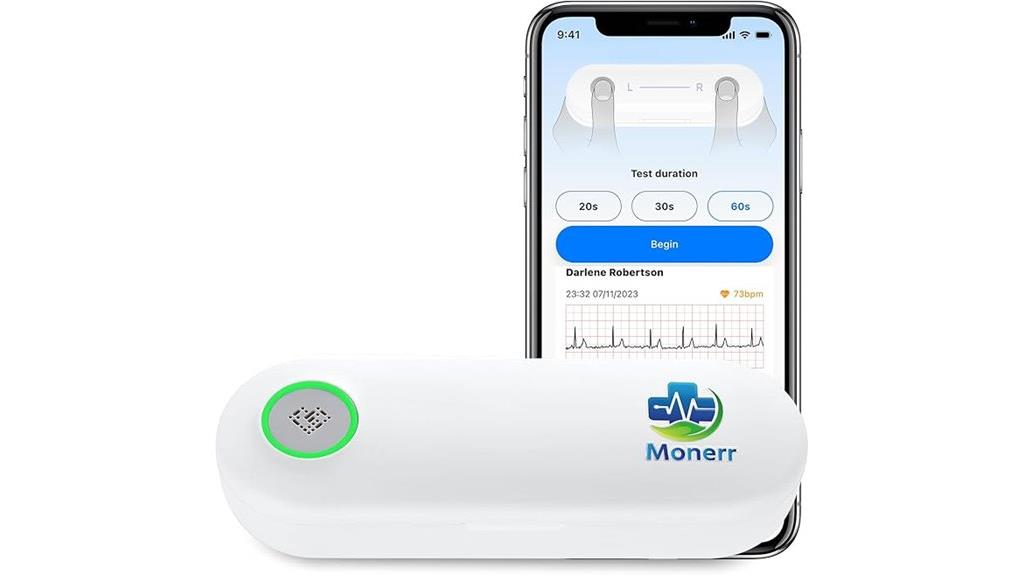
For anyone seeking a reliable, user-friendly way to monitor heart health on the go, the Portable Bluetooth Heart Rate Monitor for iOS & Android stands out as an excellent choice. It combines heart rate tracking with a smart pill dispenser, making thorough health management simple. You can test your rhythm waveform with customizable durations and easily share results with healthcare providers. The device features a long-lasting battery that lasts up to three months, with visual alerts to keep you charged. Its contactless charging and durable build ensure safety and longevity, especially for elderly users. Overall, this device offers seamless integration of heart monitoring and medication management in one compact, reliable package.
Best For: individuals seeking an all-in-one portable device for accurate heart rate monitoring and medication management, especially seniors or those with chronic health conditions.
Pros:
- Combines heart rate tracking with smart pill dispenser for comprehensive health management
- Long-lasting battery life of up to three months with visual alerts for charging needs
- Durable, contactless charging design enhances safety and extends device lifespan
Cons:
- May require smartphone compatibility and app setup for full functionality
- Limited customization options for medication scheduling may not suit complex regimens
- The device’s size and features might be less suitable for users preferring minimal or discreet health gadgets
Factors to Consider When Choosing Wireless ECG Monitors
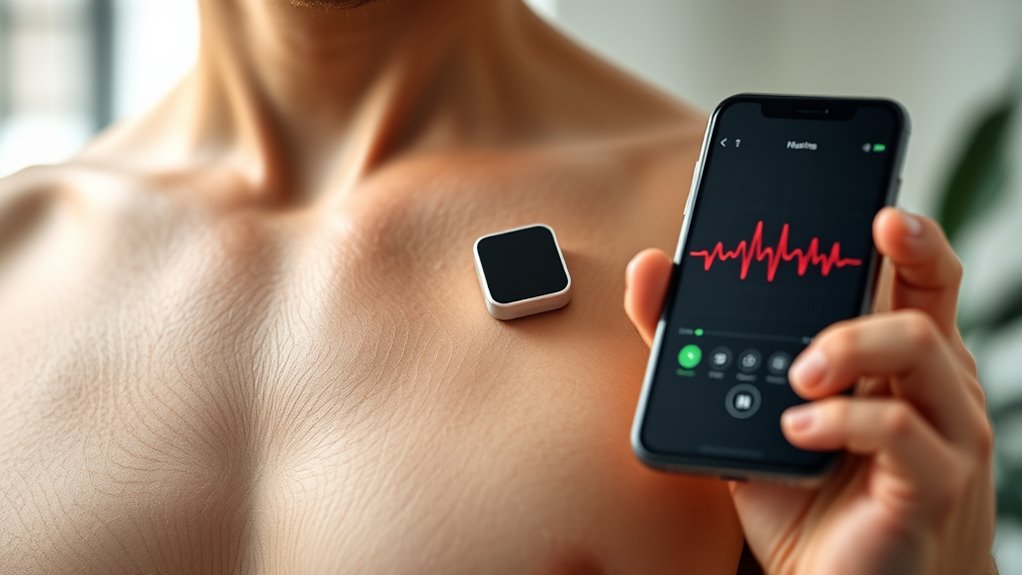
When choosing a wireless ECG monitor, I consider how well it works with my devices and how accurate the readings are. I also look at battery life, data sharing options, and how easy it is to operate. These factors help guarantee I get a reliable, user-friendly device that fits my needs.
Compatibility With Devices
Choosing a wireless ECG monitor requires careful attention to device compatibility to guarantee smooth operation. First, I check if the monitor supports my smartphone or tablet’s operating system, whether iOS, Android, or Windows. Compatibility with Bluetooth, ANT+, or Wi-Fi protocols is essential for seamless connection. I also verify if it can sync with the health or fitness apps I use for data analysis and sharing. Additionally, I consider my existing hardware—screen size and ports—to ensure the device integrates well with my setup. I review the manufacturer’s compatibility list and specifications to confirm it works reliably with my device model and software version. This careful check helps prevent connection issues and ensures I can easily access, analyze, and share my heart data without hassle.
Measurement Accuracy Levels
Ensuring accurate measurements from a wireless ECG monitor is essential for reliable detection of heart issues. Higher accuracy levels mean you’ll get precise data to identify arrhythmias and other cardiac problems early. Devices with multiple leads, like six-lead monitors, offer more comprehensive readings than single-lead models, boosting reliability. Advanced algorithms are crucial—they filter out noise caused by movement, sweat, or poor contact, ensuring clear signals. The quality of sensors and electrode placement also impacts accuracy; medical-grade sensors deliver better results. Finally, consistent calibration and validation against clinical standards are vital for maintaining accuracy over time. When choosing a wireless ECG monitor, prioritize these factors to ensure you receive trustworthy, precise heart monitoring.
Battery Life Duration
A key factor to contemplate with wireless ECG monitors is battery life, as it directly affects how often you can monitor your heart without interruptions. Longer battery life means you can perform more measurements without constantly recharging, which adds convenience and guarantees continuous health tracking. Many devices with rechargeable batteries support hundreds of scans per charge—often over 500—making them suitable for regular use. The lifespan of the battery also plays a vital role; some monitors can last 2-3 years under normal conditions, reducing the need for frequent replacements. Quick-charging features are a bonus, minimizing downtime when you need to recharge. Additionally, battery indicators and alerts help you stay informed about remaining charge, preventing unexpected power loss during critical readings.
Data Sharing Options
When evaluating wireless ECG monitors, the ability to easily share data plays a significant role in effective health management. Many devices offer options to send data via email, cloud storage, or integrated app platforms, making review straightforward. Real-time sharing with healthcare providers is often possible through secure Bluetooth or Wi-Fi connections, ensuring timely insights. Compatibility with third-party health apps can streamline data transfer and integrate ECG results into broader health management systems. Some monitors allow exporting recordings in standard formats like PDF or CSV, which is useful for professional analysis or records. Data sharing features vary widely—some devices upload data automatically, while others require manual transfer through apps or software. Clear, flexible options help guarantee your heart data is accessible whenever needed.
Ease of Use
Choosing a wireless ECG monitor becomes much easier when the device features an intuitive interface and simple activation process. I look for devices that start up automatically and have straightforward sensor placement, so I don’t waste time figuring out how to use them. Clear, real-time results displayed on my phone or on the device itself make it easy to understand my heart data without needing technical skills. Compatibility across multiple platforms like iOS, Android, and Windows is a big plus, ensuring I can use the monitor with my preferred device. Additionally, user-friendly instructions, tutorials, or troubleshooting guides help me get started quickly and resolve any issues effortlessly. Overall, a hassle-free experience hinges on simplicity and ease of operation, making regular heart monitoring more accessible and stress-free.
Medical Certification Status
Ensuring a wireless ECG monitor has the proper medical certification is crucial for trusting its accuracy and safety. Certifications like FDA approval or CE marking indicate the device has undergone rigorous testing to meet strict standards. This means the monitor is more likely to deliver reliable, precise readings essential for effective health monitoring. Certified devices have been evaluated for safety, accuracy, and consistent performance, reducing the risk of false data or unreliable results. Conversely, devices lacking proper certification might not follow regulatory requirements, increasing the chance of producing invalid or misleading data. Confirming the certification status gives both users and healthcare providers confidence in the device’s data, ensuring compliance with local regulations and supporting informed health decisions.
Frequently Asked Questions
How Do Wireless ECG Monitors Compare in Accuracy to Traditional ECG Machines?
Wireless ECG monitors are surprisingly accurate, often matching traditional machines for everyday heart monitoring. I’ve found that recent tech improvements guarantee reliable readings, especially for detecting irregularities like arrhythmias. While they may not replace high-end hospital equipment in complex cases, they’re convenient for regular use and quick screenings. For most users, wireless monitors provide a trustworthy, easy way to keep an eye on heart health without sacrificing accuracy.
What Is the Typical Battery Life for These Portable ECG Devices?
Wireless ECG monitors typically have a battery life ranging from 12 to 24 hours on a single charge, depending on the device and usage. I find that many models are designed for convenience, allowing me to easily recharge overnight or after a day of use. Some advanced devices even offer power-saving modes, extending their battery life. Overall, I recommend checking each device’s specifications to guarantee it meets your monitoring needs.
Are Wireless ECG Monitors Suitable for Continuous Heart Monitoring?
Yes, wireless ECG monitors are suitable for continuous heart monitoring. I’ve found them especially helpful because they allow me to track my heart health throughout the day without the hassle of wires. Many models offer real-time data transfer to my phone or doctor, making it easier to catch irregularities early. Just keep in mind that some devices have limited battery life, so I make sure to recharge them regularly for uninterrupted monitoring.
How Secure Is the Data Transmitted by Wireless ECG Devices?
I can tell you that the data transmitted by wireless ECG devices is generally secure, thanks to encryption protocols like SSL and AES. Manufacturers prioritize protecting your sensitive health info, but no system is entirely foolproof. I advise always using trusted devices with updated security features and keeping your app and device firmware current. Staying cautious helps ensure your heart data stays private and protected.
Can These Monitors Detect Arrhythmias or Other Heart Conditions Effectively?
Oh, absolutely, these wireless ECG monitors are practically mind readers! They effectively detect arrhythmias and other heart conditions with impressive accuracy. Thanks to advanced sensors and algorithms, I’ve seen firsthand how they catch irregularities that might go unnoticed otherwise. So, yes, they’re reliable tools for heart health, giving you peace of mind and early warnings, making them invaluable in managing your well-being efficiently.
Conclusion
Did you know that nearly 80% of heart conditions can be detected early with regular monitoring? With these top wireless ECG monitors, staying on top of your heart health has never been easier or more convenient. Whether you prefer a portable device or a chest strap, there’s something here for everyone. Taking control of your heart health is just a click away—so why not start today and keep your heart in check effortlessly?
